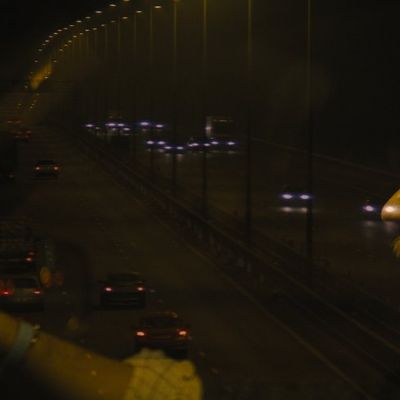
The new British drama Locke might not seem so odd if it were a radio play or even a stage play: The title character and his tense situation are fairly conventional. But to do what Locke does as a movie — that takes daring. The film is set in one space at one time. The arc of action is continuous. There is only one character onscreen, and just the top third of him: a man in a car, southbound on an English motorway from Birmingham to London. His name is Ivan Locke, he’s played by Tom Hardy, and he’s upending in his life in front of your eyes.
Also, your ears. Locke has a hands-free phone, and he’s making and taking calls from the movie’s first moment to its last. The conversations are urgent, because Locke has just left his home and job without warning. In the first 15 minutes, we learn that there’s a woman in London who’s about to give birth to a baby he fathered, and that she’s not his wife. He barely, truth to tell, knows her, though he knew her, if you know what I mean, and there was a fascinating context for their tryst. We also learn that something momentous will occur at his job site at half-past-five the next morning, and that he won’t be there. It will be one of Europe’s all-time biggest pours.
It takes a while to adjust to the thick regional English accents, so I’ll admit that for a minute or two I thought Locke ran a brewery and that the pour was of real ale. But, no. It’s concrete. There’s a 55-story building going up, and Locke is in charge of the foundation. Tens of millions of dollars apparently ride on that pour, and good old steady-solid-responsible Locke is the most reliably superb of pourers. This, you see, is because of his reverence for the concrete. He understands its various textures and density. He understands it spiritually. It is something that lives and breathes, he says, supporting structures that “displace the sky.”
So, as he drives, Locke has heated conversations with his outraged boss, an inebriated underling who must now take charge of the pour, the policemen who must close the roads, and a councilman who must to approve those closings — not to mention the sons waiting for him to come home to watch a big football match, the wife who suspects nothing, and the woman in the London hospital whose labor is increasingly dire.
There are recognizable actors on the soundtrack, among them Olivia Colman as the needy mother-to-be and Andrew Scott — the devilishly unhinged Moriarty of Sherlock — as the drunken sidekick who has responsibility so unceremoniously thrust upon him. But this is, of course, Hardy’s show.
He’s one of those actors I’d be afraid to approach on the street. He’s not big, but the fact that he played the psychotic strong man Bane in The Dark Knight Rises tells you he can look and act huge. He has what Richard Burton had, at least before Burton turned sodden from all that booze — a quicksilver temperament. The low boil is his natural state. He’s bearded here, which softens his thick lips, and the accent he adopts reminds me of Burton’s — the effect is like a Welsh bully boy playing King Arthur. Civilized as Locke is, nothing can soften Hardy’s innate volatility. He never seems still, even when his face is immobile, even when he’s trying so carefully to modulate his tone. The film was written for him and is unimaginable without him.
Steven Knight (who wrote Dirty Pretty Things and Eastern Promises) is the director, and he has, as I’ve said, done an ordinary thing in an extraordinary way. Ivan Locke — who has left his former life to reverse his destiny, who speaks with awe about displacing sky, who reminds us that his world has now been reduced to himself and his car — is a textbook existential hero. Why has Locke taken this dramatic step? Without revealing too much, I’ll say it all goes back to childhood — as things generally do. I’ll say he’s trying to prove that he’s not a slave to fate, even at the cost of everything he knows and much of what he loves. It’s a literary conceit, but it plays like gangbusters.
Knight gives us something else onscreen in Locke: a near-abstract lightscape. The headlights that pass blur into ovals and, towards the end, when the rain becomes steady, they vaguely resemble angels — though perhaps I’m projecting. In the rearview mirror, Locke’s eyes drift amid a sea of lights. There are reflections, double exposures, patches of melancholy blue and a kind of yellow that, overexposed, makes his face blaze. Dikon Hinchliffe’s music floats, too, but there’s an underlying pulse that quickens and slows. The score, the cinematography, the editing: It all mirrors its hero’s inner state.
“Tour-de-force” is such an overused term (by me as much as any other critic) that you’re apt to say, “Ho-hum, another one of those.” But, really. This one is. I’m not crying “masterpiece” here. Locke is too contained, too well-carpentered, too self-consciously “classical.” But tours don’t come much more forceful. Once you’ve taken this 90-odd-minute drive with Tom Hardy, you’ll never forget his face.


